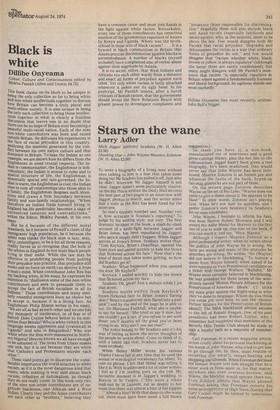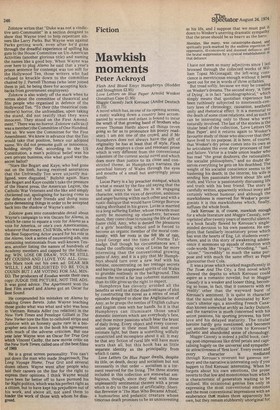Stars on the wane
Larry Adler
Mick Jagger Anthony Scaduto (W. H. Allen E3.50) Shooting Star — John Wayne Maurice Zolotow (W. H. Allen £3,50) To write a biography of a living man without once talking to him is a feat that takes some doing but Mr Scaduto has pulled it off. Just why he didn't interview Mr Jagger himself is not clear. Jagger doesn't seem particularly elusive; on the day this is written the Daily Mail devotes the best part of two pages to an interview with Jagger, photos to match, and the writer notes that a suite at the Ritz has been hired for the interview.
So that's mystery number one. Number two is, how accurate is Scaduto's reporting? To judge by his writing style, not very. The first dramatic incident in the book, a slash-by-slash account of a knife-fight between Jagger and Brian Jones, has been repudiated by Jagger, who says it simply didn't happen. When Jagger arrives at Jones's house, Scaduto writes thus: "Tom Keylock, Brian's chauffeur, opened the front door and smiled quickly to hide the frown that flickered across his face." Now that's the kind of detail that takes some getting, so how did Scaduto get it? Scaduto: What happened when you opened the door, Mr Keylock? Keylock: I smiled quickly to hide the frown that flickered across my face.
Scaduto: Oh, great! Just a minute while I jot that down.
Scaduto moves swiftly from Keylock's frown-flickered face to Brian Jones's flaring skin ("Brian's translucent skin flared into a pale pink") and by the end of the page he is able to say, for Marianne Faithfull, what she is unable to say for herself: "She tried to say it now, but she couldn't get it out; if you refuse to eat with Brian you'll destroy all the good you've been trying to do. Why can't you see that?" The italics belong to Mr Scaduto and it's his way of letting us know the secret thoughts of the people he writes about. Come to think of it, with a talent like that, Scaduto never has to meet anybody.
When Henry Miller wrote his various Tropics I never felt at any time that he used the sexual or scatological vocabulary for effect. To coin no phrase, I felt that Miller was telling it like it is, With Scaduto and a lot of other writers I feel as if I'm reading porn on the cob. My favourite moment is at Jagger's wedding to Bianca in St Tropez. ("She ,wore a white midi-suit by St Laurent, cut so deeply to her waist that there was almost a hint of her nipples ..." Almost a hint? With that deep-to-the-waist cut, there must have been more a full blown
suggestion.)
So there you have it, a non-book, manufactured out of interviews and a good press-cuttings library, plus the hot line to the subconscious. Jagger hasn't been given a real biography, he's been scadutoed. One would never say that John Wayne has been zolotowed. Maurice Zolotow is an honest pro and whatever the faults of the book, hyped-up fan-rnag gimmicks are not part of them.
On the second page Zolotow describes Wayne on the set of Rio Lobo: "Wayne does not seem to give a damn about it. He appears to be blase." In other words, Zolotow isn't playing God, When he's not sure he qualifies, and I prefer Zolotow's sure hesitancy to Scaduto's hit-or-miss infallibility.
John Wayne, I hesitate to inform his fans, was born Marion Robert Morrison and I will award the Adler Medal for Bravery to the first one of you to walk up, slap him on the back, if you can reach it, and say, "Hiya, Marion."
Although I respect Maurice Zolotow as a good professional writer, when he writes about the politics of John Wayne he is wrong, his facts are wrong and many of the attitudes he describes are wrong. He writes, "He (Wayne) did not believe in blacklisting." To borrow a quote from Wayne himself, when asked if he were running as Vice-Presidential candidate on a ticket with George Wallace, "Bullshit." Mr Wayne most certainly believed in blacklisting. He was president for three terms of the wondrously named 'Motion Picture Alliance for the Preservation of American Ideals.' ( I think my main gripe against the Right-wing is what they've done to language. Whom do you think YOU could get, over here, to join the 'Motion Picture Alliance for the Preservation of British ideals?) The MPA blacklisted almost anyone to the left of Ronald Reagan. One of its past presidents had been Robert Taylor, who I remember had suggested that members of the Beverly Hills Tennis Club should be made to sign a loyalty oath as a requisite of membership, Carl Foreman, in a recent magazine article, writes vividly about his personal blacklisting at the hands of John Wayne, who tried to get him to go through the, by then, usual routine of recanting (for what?), breast-beating and shopping one's friends. When Foreman declined the honour Wayne told him straight that he'd never work in films again or, for that matter, anywhere else, even overseas because, said Wayne, the blacklist would operate there too. Even Zolotow admits that Wayne phoned Foreman asking that Foreman remove his name as scriptwriter of High Noon, fearing that Gary Cooper might be tainted by association with Foreman.
Zolotow writes that "Duke was not a vindictive anti-Communist" in a section designed to show that Wayne tried to help repentant sinners like Larry Parks. But Wayne was against Parks getting work, even after he'd gone through the dreadful experience of spilling his guts to the House Committee on Un-American Activities (another glorious title) and naming the names like a good boy. When Wayne was over here to plug Alamo he said that a year's prison sentence for contempt was too soft for the Hollywood Ten, those writers who had refused to knuckle down to the committee chaired by J. Parnell Thomas (who later joined them in jail, he being there for accepting kickbacks from government employees).
Zolotow is also widely off the mark when he writes about the committee of theatrical and film people who organised in defence of the Hollywood Ten. "To their (the theatrical committee's) horror, the unfriendlies, upon taking the stand, did not testify that they were innocent. They stood on the First Amendment." There was no horror. Zolotow calls us (I was a member) the Committee of One Hundred. Not so. We were the Committee for the First Amendment. We knew in advance that the Ten would take that position, hence our adopted name. We did not presume guilt or innocence, holding simply that, according to the US Constitution, a man's political belief was his own private business, else what good was the secret ballot?
"Stars like Bogart and Kaye, who had gone out on the limb, having received assurances that the Unfriendly Ten were unjustly maligned, were disgusted." Bullshit again. Stars like Bogart and Kaye couldn't take the pressure of the Hearst press, the American Legion, the Catholic War Veterans and the like and simply chickened out, apologising for having come to the defence of their friends and doing some quite demeaning things in order to be accepted back into the shadow of Wayne's smile.
Zolotow goes into considerable detail about Wayne's campaign to win Oscars for Alamo, in which he came to equate a vote for Alamo as a vote for America, or one's own Americanism, whatever that meant. Chill Wills, who was after the Best Supporting Actor award for his role in the Alamo, took a series of nauseating ads, one containing testimonials from well-known Texans, another listing the names of hundreds of Academy members and capped by the following: WIN, LOSE OR DRAW, YOU'RE STILL MY COUSINS AND I LOVE YOU ALL. Groucho Marx took out his own ad: DEAR MR WILLS, I AM DELIGHTED TO BE YOUR COUSIN BUT I AM VOTING FOR SAL MINE°. The producers of Exodus wrote their own copy: JUDGE THE PICTURE, NOT THE ADS. It was good advice. The Apartment won the Best Film award and Alamo got an Oscar for Best Sound, He compounded his mistakes on Alamo by making Green Berets. John Wayne teaching those gooks what was what and who was boss in Vietnam. Renata Adler (no relation) in the New York Times and Penelope Gilliatt in The New Yorker tore the film to celluloid strips and Zolotow with an honesty quite rare in a biographer sets down in the book his agreement with much of the adverse criticism. But one year later Wayne won an Oscar for True Grit which Vincent Canby, the new movie critic on the New York Times, called one of the best films of 1969.
He is a great screen personality. You can't put down the man who made Stagecoach, The Long Voyage Home, True Grit and several dozen others. Wayne went after people who laid their careers on the line for the right to express their opinions. I think Wayne would have been far better off to have pursued his far-Right politics, which was his perfect right as a citizen, but to have kept his prejudices out of his work, and above all, not used them to hinder the work of those with whom he disagreed.



































 Previous page
Previous page